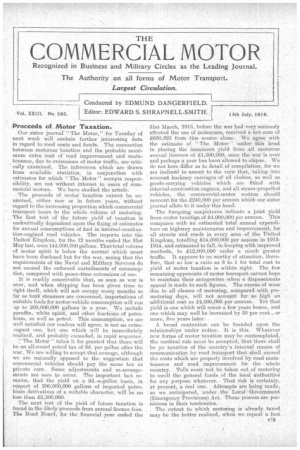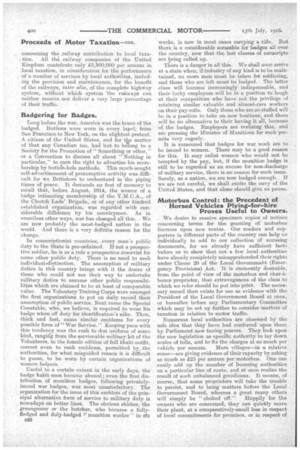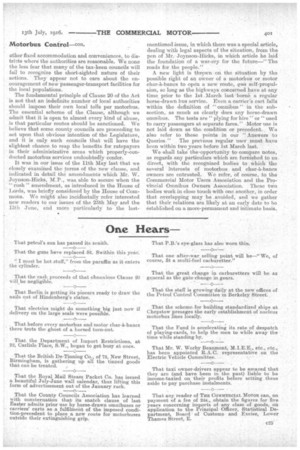Proceeds of Motor Taxation. .
Page 1

Page 2

Page 3

If you've noticed an error in this article please click here to report it so we can fix it.
. Our sister journal " The Motor," for Tuesday of next week will contain further interesting data in regard to road costs and funds. The connection between motorcar 'taxation and the probable maximum extra cost of road improvement and maintenance, due to extensions of motor traffic, are oralcally examined. The inferences which are drawn from available statistics, in conjunction with estimates for which " The Motor" accepts responsibility, are not without interest to users of commercial motors. We have studied the article.
The proceeds of motor taxation cannot be examined, either now or in future years, without regard to the increasing proportion which commercial transport bears to the whole volume of motoring. The first .test of the . future yield of taxation is undoubtedly dependent upon the fixing of estimates for annual consumptions of fuel in internal-oombustion-engined road vehicles. The imports into the United Kingdom, for the 12 months .ended the 31st May last, were 141,000,000 gallons. That total volume of Motor spirit is below the normal which must have been disclosed but for the war, seeing that the require.m4nts of the Naval and Military Services do not exceed the enforced curtailments of consumpCon, compared with peace-time extensions of use.
It is readily conceivable that, as soon as war is over, and when shipping has been given time to right itself, which will not occupy many months so "far as tank steamers are concerned, importations of suitable fuels for motor-vehicle consumption will run -ap to 200,000,000 gallons in a year. We include paraffin, white spirit, and other fractions Of petroleum, as well as petrol. This consumption, we are well satisfied our readers will agree, is not an extravagant one, but one which will be immediately realized, and probably exceeded, in rapid sequence.. The Motor" takes it for granted that there will be an all-round petrol tax of 3d. per gall'cal after the war. We are willing to accept that average, although we are. naturally opposed to the suggestion that commercial vehicles should pay the same tax as private cars. Some adjustments and re-arrangements are sure 0 occur. The important fact remains, that the yield on a 3d.-a-gallon basis, in respect of 200,000,000 gallons of imported. petroleum ilerivatiVes of a suitable character, will be no less than £2,500,000. • The next test of the yield of future taxation is found in the likely proceeds from annual licence fees. The Road. Board, for the financial year ended the 31st March, 1915, before the war had very seriously affected the use of motorcars, received a net sum of 1030,325 from this source alone. We agree with the estimate of " The Motor" under this head in placing the imminent yield from all motorcar annual licences at 11,500,000, once the war is over and perhaps a year has been allowed to elapse. We do not here differ as to detail of compilation, for we. are inclined to assent to the view that, taking into account hackney carriages of all classes, as well as goods-carrying •vehicles which are fitted with internal-combustion engines, and all steam-propelled vehicles, the commercial-motor section should account for the £240,000 per annum which our sister journal allots to it under this head.
The foregoing conjectures indicate a joint yield from motor taxaticin of £4,000,000 per annum. This compares with an estimated total annual expenditure on highWay maintenance and improvement, for all streets and roads in every area of the United Kingdom, totalling £14,000,000 per annum in 10131914, and estimated to fall, in keeping with improved methods, to £12,000,000under a much greater traffic. It appears to us worthy of attention, therefore, that so •low a ratio as 3 to 1 for total cost to yield of motor taxation is within sight. The few remaining opponents of motor transport. cannot hope to maintain their antagonism when a dispassionate appeal is made to such figured. The excess of wear due to all classes of motoring, compared with premotoring days, will not account for so high an additional cost as £4,000,000 per annum. Yet that yield is one which will occur a few years hence, and one which may well be increased by 50 per cent., or more, five years later. • broad contention can be founded upon the relationships under notice.It is this. Whatever new forms of motor taxation may be contemplate& the -cardinal rule must be accepted, that there shall be no taxation of the country's internal means of communication by road transport that shall exceed the costs which are properly involved by road maintenance and road improvement for, the whole country. Tolls must not .be taken out of motoring to swell the general funds of the local authorities for any purpose. whatever. That risk is c.ertainly; at present, a real one. Attempts are being made, as we anticipated, under the Leal, Government (Emergency Provisions)Act. These • powers are pernicious in their tendencies.
. The .extent to which Motoring is already taxed may be the better realized, when we repeat a fact concerning the „railway contribution to local taxa.
• tion. All the railway companies of the United Kingdom contribute only R5,300,000 per annum in local taxation, in consideration for the performance of a number of services by local authorities, including the provision and maintenance, for the benefit • of the railways, inter alia, of the complete highway system, without which system 'the railways can neither receive nor deliver a very large percentage of their traffic.
Badgering for Badges.
Long before the war, America was the home of the badged. Buttons were worn in every lapel, from San Francisco to New York, on the slightest pretext. A citizen of the United Stiates, and for tite matter of that any Canadian too, had but to belong to a 'Society for the Promotion of" Something or other," or a Convention to discuss all about "Nothing in particular," to earn the right to advertise his membership by butan-hole methods, This much-sought self-advertisement of presumptive activity was difficult for We Britishers to understand in the piping times of peace. It demands no feat of memory to recall that, before August, 1014, the wearer of a badge intimating membership of the Y.M.C.A., of the Church Lads' Brigade, or of any other kindred established organization, was regarded with considerable diffidence by his countrymen. As in countless other ways, war has changed all this, We are now probably the most-badged nation in the world. And there is a very definite reason for the change.
Iü conscriptionist countries, every man's public duty to the State is pre-ordained. If not a prospective soldier, he is as a rule a prospective reservist for some other public duty. There is no need to seek individual Klistinction. The assumption of military duties in this country brings with it the desire of those who could not see their way to undertake 'military duties to assume other public responsibilities which are claimed to be at least of comparable value. The Voluntary Training Corps were amongst the first organizations to put on daily record their assumption of publie service. Next came the Special Constable, who, we believe, is required to wear his badge when off duty for identification's sale. Then, thick and fast, came similar emblems for every possible form of `• War Service." Keeping pace with this tendency was the rush to don uniform of some kind, ranghTg from the serviceable military kit of the Volunteers, to the female edition of full khaki outfit, correct even to rank emblems, permitted by. the authorities, for what misguided reason it is difficult to guess, to be worn by certain organizations of women helpers.
Useful to a certain extent in the early days, the badge habit soon became abused ; even the first distribution of munition badges, following privatelyissued war badges, was most unsatisfactory. The organization for the issue of this emblem of the principal alternative form of service to military duty is nowadays on better lines. The obvious shirker, the greengrocer or the butcher, who became a fullyfledged and duly-badged ilmunition worker" in six 020 weeks, is now in most cases carrying a rifle. But there is a considerable scramble for badges all over the country, now that the last classes of conscripts are being called up.
There is a danger in all this. We shall soon arrive at a state when, ifind_ustry of any kind is to be maintained, no more men must be taken for soldiering, and those who are loft must be badged. The latter class will become increasingly indispensable, and their lucky employers will be in a position to laugh at their conipetitors who have not the privilege of retaining similar valuable and almost-rare workers on their pay-rolls. Only those who are so staffed will he in a position to take an new business, and there will be no alternative to their having it because of the badges. Employers are realizing this, and are pressing the Minister of Munitions for such permits very eagerly.
It is rumoured that badges for war work are to be issued to women. There may be a good reason for this. It may enlist women who would not be tempted by the pay, but, if the munition badge is still to be regarded as an excuse for non-diselaarge of military service, there is no reason for such issue. Surely, as a nation,, we are now bulged enough. If we are not careful, we shall excite the envy of the United States, and that alone should give us pause.
Motorbus Control: the Precedent of Horsed Vehicles Plying.for-hire Proves Useful to Owners.
We desire to receive specimen copies of notices concerning terms for the, granting of motorbus licences upon new routes. Our readers and supporters in different parts of the country can help us individually to add to our collection of accusing documents, for we already have sufficient facts before us to show that not a few local authorities have already completely misapprehended their rights under Clause 20 of the Local Government (Emergency Provisions) Act. It is eminently desirable, from the point of view of the motorbus. and char-iibanes proprietor, that extravagances of the class to which we refer should be put into print. The necessau record. then exists for use as evidence with the President of the Local Government Board at once, or hereafter b.ef ore any Parliamentary Committee which may be set up further to consider matters of taxation in relation to motor traffic.
Numerous local authorities are obsessed by the sole idea that they have had conferred upon them by Parliament new taxing powers. They look upon the new legislation as specific authority to lay down scales of tolls,, and to fix the charges at so much per vehicle per annum. Mere villages—in a relative sense—are giving evidence of their rapacity by asking as much as L25 per annum per motorbus. One can easily add up the number of licensing authorities on a particular line of route, and at once realize the result of such unbalanced greediness. It means, of course, that some proprietors will take the trouble to persist, and to bring matters before the Local Government Board, whereas a great Many others.
will simply be "choked off." Happily for the owners who are concerned, they can quickly move their plant, at a comparatively-small loss in respect of local commitments for premises, or in respect of other fixed accommodation and conveniences, to distriats where the authorities are reasonable. We none the less fear that many of the tax-keen councils will fail to recognize the short-sighted nature of their actions. They appear not to care about the encouragement of new passenger-transport facilities for the local populations.
The fundamental principle of Clause 20 of the Act is not that an indefinite number of local authorities should impose their own local tolls per motorbus. The essential scheme of the Clause, although we admit that it is open to almost every kind of abuse, is that particular routes should be sanctioned. We believe that some county councils are proceeding to act upon that obvious intention of the Legislature, and it is only such councils that will have the slightest chance to reap the benefits for ratepayers in their administrative areas which properly-conducted motorbus services undoubtedly confer.
It was in our issue of the 11th May last that we closely examined the terms of the new clause, and indicated in detail the amendments which Mr. W. Joynson-Hicks, M.P., was, able to secure when the " rush " amendment, as introduced in the House of Lords, was briefly considered by the House of Commons. We might also incidentally refer interested new readers to our issues of the 25th May and the 15th June, and more particularly to the last mentioned issue, in which there was a special article, dealing with legal aspects of the situation, from the pen of Mr.. Joynson-Hicks, in which article he laid the foundation of a war-cry for the future—" The roads for the people."
A new light is thrown • on the situation by the possible right of an owner of a motorbus or motor char-A-banes to open a new route, qua self-propulsion, so long as the highways concerned have at any time prior to the 1st .March last borne a regular horse-drown bus service. Even a carrier's cart falls within the definition of " omnibus " in the subsection, as much as clearly does any horse-drawn omnibus. The tests are " plying for hire " or" used to carry passengers at separate fares." Motor use is not laid down as the condition or precedent. We also refer to these points in our "Answers to Queries." The previous regular user must have been within two years before 1st March last.
We -shall take the, opportunity to compare notes, as regards any particulars which are furnished to us direct, with the recognized bodies to which the several interests of motorbus and char-à-bancs owners are entrusted. We refer, of course, to the Commercial Motor Users Association and the Provincial Omnibus Owners Association. These two bodies work in close touch with one another, in order that overlapping may be _avoided, and we gather that their relations are likely at an early date to be established on a more-permanent and intimate basis..
























